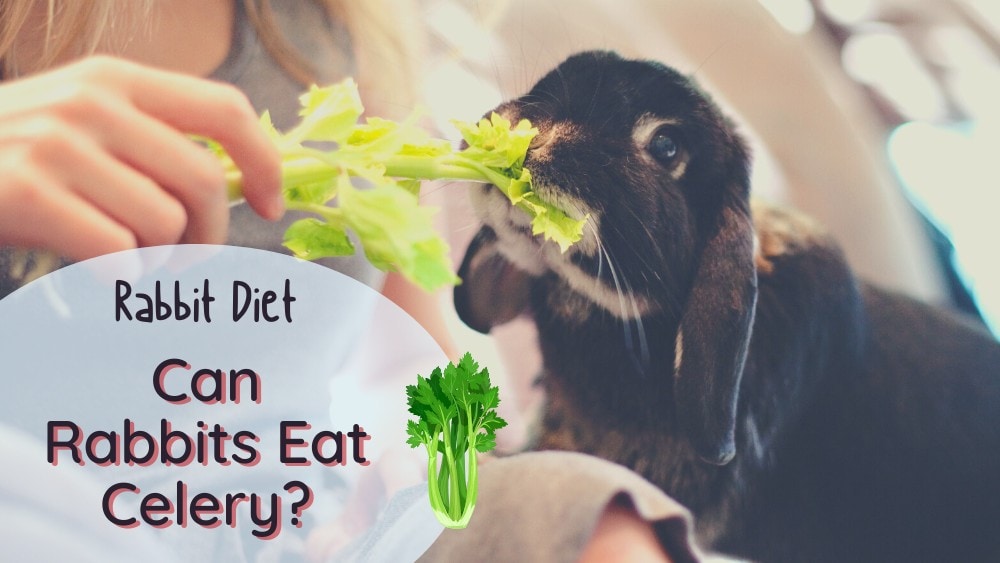Rabbits are herbivores and require a balanced diet of fresh veggies, fruits, and hay. Still, when feeding your pet bunny, it’s important to be mindful of what foods are safe for them to eat, and one food that is often questioned is celery.
So, can rabbits eat celery? The good news is that you can share this healthy vegetable with your bunny, but you need to take some precautions to make sure it’s safe for them.
In this article, we will discuss the following:
- Health benefits of celery to a rabbit
- How to prepare celery for rabbits
- Parts of celery your bunny can safely eat
- What parts of celery are toxic
Can Rabbits Eat Celery?
Yes, adult rabbits can eat celery. Celery is a crunchy, low-calorie vegetable that is high in water and fiber. It also contains vitamins and minerals. While celery can be a healthy addition to a rabbit’s diet, you should cut it into small sections to break up the long tough fibers which can upset your rabbit’s stomach.
What Are the Health Benefits of Feeding Celery to Rabbits?
These are some of the benefits your pet rabbits benefit from eating celery.
Improved digestive health
Celery is high in fiber, which helps to promote healthy digestion in rabbits. It helps to regulate their bowel movements and prevent constipation and diarrhea.
Hydration
As mentioned, celery has a high water content, which helps to keep rabbits hydrated. The water in celery also helps in digestion, nutrient absorption, and waste removal.
Source of vitamins and minerals
Celery contains certain nutrients that are important for supporting the overall health of rabbits:
- Folate (folic acid)
- Potassium
- Vitamin B6
- Manganese
- Vitamin B2
- Phosphorous
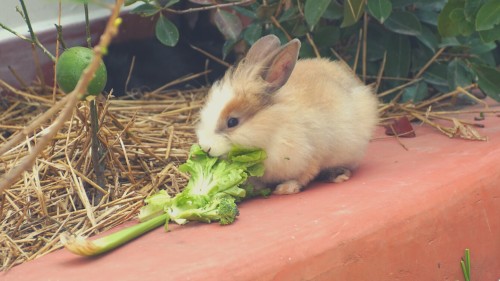
Low-calorie treat option
Many rabbits enjoy the taste of celery, and it can be a low-calorie treat option. When fed in moderation, it can help to satisfy their appetite without causing them to gain excess weight.
Wearing their teeth down
While rabbits enjoy gnawing on celery stalks and leaves, they also wear their teeth down and keep them in shape.
How to Safely Introduce Celery to Your Rabbit’s Diet
If you want to introduce celery to your bunny’s diet, do so gradually to avoid any digestive issues.
- Ensure that the celery you give your rabbit is organic and free from pesticides or other harmful chemicals.
- Always cut celery into small pieces before feeding it to your rabbit. This will make it easier for your rabbit to chew and digest, by breaking up the long tough fibers.
- Start by giving a small leaf or small piece of cut stalk and monitor your rabbit’s behavior to ensure they tolerate it well.
- Gradually increase the amount of celery after a few days and check for signs of digestive issues such as diarrhea or bloating.
- Offer other vegetables too to diversify their diet.
If you have any concerns or questions about introducing celery to your rabbit’s diet, it’s always best to consult with a veterinarian first for advice.
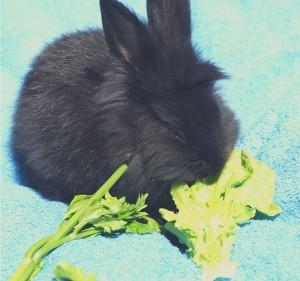
How Much Celery Should You Feed Your Rabbit?
When it comes to feeding celery to your rabbit, you should offer it in small amounts, such as a couple of small pieces or leaves, once or twice a week.
We prefer to only feed rabbits celery a few times a week because feeding too much celery will mean your bunny will eat less hay, but hay is vital for their gut health.
Can rabbits eat celery every day?
Can rabbits eating celery every day upset their digestive system? Yes, it can. It is best practice to offer celery only once in a while, as your bunny should also get nutrients from other veggies too.
To summarize what a rabbit’s diet should consist of – clean water, hay and grass, leafy greens, a few good quality pellets, and occasional healthy treats. Therefore, treat the celery plant just as a treat and not part of the rabbit’s daily diet.
Here are a few celery alternatives your pet rabbit can snack on:
- Leafy greens: Rabbits love leafy greens like Romaine lettuce, kale, spinach, carrot tops, cilantro, broccoli greens, basil, and beet greens. These are low in calories and high in fiber, making them a great choice for a rabbit’s diet and also helping prevent GI stasis.
- Carrots: Carrots are a great snack for rabbits, but they should be given in moderation due to their high sugar content. You can offer them as a treat once or twice a week.
- Fruits: Rabbits enjoy fruits like apples (without seeds), bananas, berries, cherries (without seeds), oranges, and watermelons. Remember to give fruits in moderation due to their high sugar content.
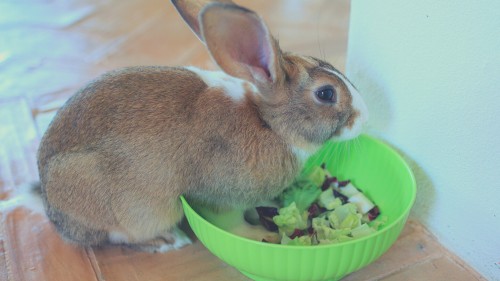
Frequently Asked Questions
Can rabbits eat celery stalks?
It is safe to give celery stalks to rabbits. However, you need to exercise caution while doing this.
Celery stalks contain fibrous strings that can be difficult for rabbits to digest because they are tough. These celery strings can become tangled in a rabbit’s teeth or intestines, leading to health problems if consumed in large quantities.
Whenever you decide to give celery sticks to your pet rabbit, be mindful of the number of celery stalks that you feed them. Always cut the stalks into small pieces before offering the celery to your rabbit.
Can rabbits eat celery leaves?
Yes, rabbits can eat celery leaves and most other leafy vegetables. These leaves are actually safer than the stalks because they do not have fiber strings that can be a health hazard to your pet bunny. The leaves also contain less water and sugar, making them perfect snacks for bunnies.
To prepare celery leaves for your rabbit, first, make sure they are thoroughly washed to remove any dirt or pesticides. Then, you can simply offer a few leaves to your rabbit as a part of their regular diet. You can chop the leaves into smaller pieces to make them easier for your rabbit to eat.
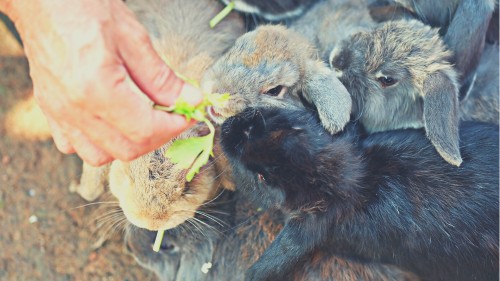
A good rule of thumb is to offer celery leaves or any part of the celery as an occasional treat only rather than a staple food in your rabbit’s diet.
Celery contains oxalic acid in small quantities, and when you feed celery leaves to your rabbit every day or in large quantities, oxalates build up and can cause kidney damage. Instead, give plenty of hay and rotate the leafy greens you feed them.
Can rabbits eat cooked celery?
So, you’ve cooked celery for yourself and have remembered that you didn’t leave any raw for your bunny.
You are faced with the dilemma of whether it’s safe to give cooked celery to your bunny. Well, it’s not recommended to give cooked celery to rabbits because:
- Vegetables can lose some of their nutritional value when cooked
- Cooked celery can be difficult for rabbits to digest
Also, the seasonings were often used when cooking celery, like salt, processed spices, and other additives, can be harmful to rabbits.
Can you feed a rabbit celery roots?
Yes, celery roots are safe for rabbits to eat and can be a healthy addition to their diet when given in moderation. Celery roots are a good source of fiber, vitamins, and minerals that are important for a rabbit’s health.
To prepare them for your rabbit, make sure they are thoroughly washed to remove any dirt or pesticides. Then, chop the roots into small pieces and offer them to your rabbit as a treat in addition to their regular diet.
Can you feed celery flowers to rabbits?
Celery flowers have not been classified as edible rabbit food. Therefore, it’s best to practice caution and only give the leaves, stalk, or roots in moderation.
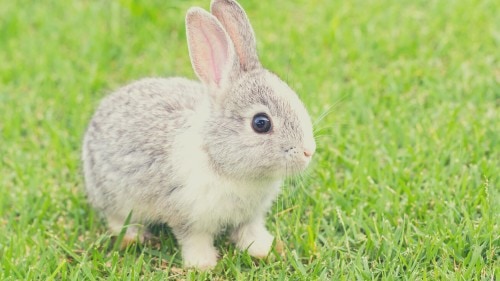
Can bunnies eat celery seeds?
Although we use celery seeds as a spice for stews, they are not appropriate for your pet bunny. Also, it is not safe to feed any nuts and seeds to rabbits because they contain too much fat and protein.
Can baby rabbits eat celery?
Feeding celery to baby rabbits is not recommended as their digestive systems are very delicate and still developing. Celery is high in fiber, which can cause digestive problems in young rabbits, such as diarrhea and bloating.
Baby rabbits only need their mother’s milk because their digestive systems are still developing. Therefore, you shouldn’t feed them celery, herbs, or other veggies for the first four months.
Once baby rabbits reach 12 weeks old, you can gradually introduce them to new foods such as hay, fruits, celery, and other fresh vegetables.
As you introduce young rabbits to new foods such as celery, do it in small quantities to avoid upsetting their digestive systems. It’s always best to consult with a veterinarian who is knowledgeable in rabbit care for specific feeding recommendations.
Can wild rabbits eat celery?
Although wild rabbits are foragers, celery is not their snack preference in the wild. This is because they are adapted to the foods found in their environment. However, they also don’t eat domesticated root vegetables like carrots in the wild, despite carrots being their iconic symbol.
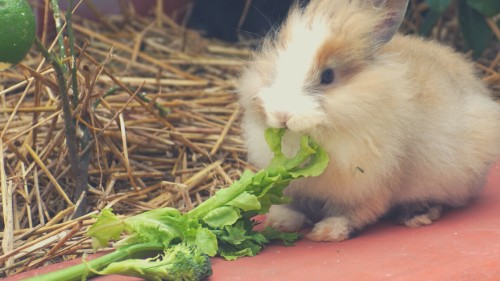
Wild rabbits mostly forage for grass and leafy veggies, and if you have domesticated wild rabbits, you can still offer them celery but in small portions. However, ensure that grass or hay forms the majority of their diet.
Final Thoughts
Chewing on crunchy celery also helps to wear down your rabbit’s ever-growing teeth, which is a good thing. It is also a nutritious treat when you offer it in moderation. Remember to always chop the celery stem, so it does not become a choking hazard for your bunny.
Their low-calorie content makes them safe to give to overweight rabbits, unlike carrots which have a high sugar content. If you aren’t feeding your rabbit celery, we hope that this guide has answered all your questions so that you can confidently feed this healthy snack to your bunny.
Did you enjoy reading this article? Let us know in the comment below. Also, like and share with other bunny lovers if you found the information helpful!


